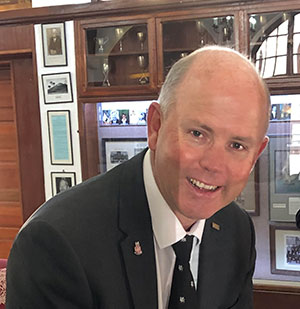The challenges facing school fundraisers post Covid-19
As we look ahead to returning to our schools, it’s clear this school year will be unlike any other in recent memory. The shift of moving from working remotely from home to being back in the office again will present a range of fresh challenges.
I started my fundraising career in 1989 in South Africa where handwritten letters and cards, telephone calls and face-to-face meetings were a fundraiser’s way of life. We had very basic computers (compared to what we have become used to today), no mobiles, no emails, no relationship databases, no social media and opportunity to travel internationally. Roll forward over 30 years where today the internet, social media, powerful databases, international travel (which will hopefully return to normal in the coming months) and virtual meetings are the norm.
A few days ago, I received an email and a survey entitled ‘Returning to Work – Heads of Department responsibility’. This was a return to work department checklist for all support staff to understand the constraints as we return more colleagues to school. The stark message was school life will be different!
Five challenges I noted from this survey are:
1. Staff bubbles
One of the things I have enjoyed most about working in a school is the opportunity to step out of my office and, within the confounds of the school, be able to chat to pupils, staff (both teaching and support), volunteers, parents and former pupils visiting the school.
A short trip to the coffee machine or to watch a sports match/play/musical usually meant bumping into a host of people, which often resulted in new contacts being made and ideas shared. In the future, the chat walking from our cars to the office with a colleague will be lost as we arrive and leave at different times.
This will be changing as we all stay in our own designated area (or bubble) to ensure we do not mix with other bubbles. This will cut down the spontaneous meetings I have enjoyed and found so useful over the years BUT should not stop us doing our work networking among our communities. Instead, these will have to be more carefully planned and more often done virtually or in the school grounds.
2. Reducing staffing maximum to 50%
Sharing and smaller office space will become a problem as social distancing is adhered to. Access to toilets, coffee machines, social areas and the much-loved school lunch will need to be staggered and, in some cases, removed (school lunches becoming packed lunches). These are necessary consequences of the fight against Covid-19 BUT we need to ensure we do not keep so far apart that we never speak to colleagues and lose the power of the team.
I work with one other colleague. The easiest solution would be for us to split the week in half and each work one half. While some flexibility will be required, be careful of falling into the trap of working so remotely that teams never see each other face to face.
Advertisement
3. Staff meetings should be held virtually where possible
The suggestion is that meetings are held outdoors where virtual meetings are not possible and kept as short as possible. I am always keen to keep meetings brief, but if we rely solely on very short indoor, slightly longer outdoor or virtual meetings, we risk losing the benefit of collective thinking and decision making.
I, like others, have been on virtually daily Zoom calls during lockdown. My first virtual Campaign Board meeting had the first full-house attendance and a virtual donor thank-you event had donors joining us from all over the world, many of whom would not have attended a face-to-face meeting due to age-related travel constraints.
Virtual meetings do work BUT should not replace face-to-face meetings/events going forward. One of my Board members commented on how much he had enjoyed being part of the virtual meeting but he had not felt comfortable to ask questions and contribute as much as he would have had we been sitting around a table.
4. Lunches and coffee breaks
Schools will have to adapt to the ‘new norm’ and a major part of this will be a new school timetable to allow staff and pupils to move around the site, avoiding each other where possible.
This will mean fewer people in the dining room and common room at the same time which will further limit the opportunity to network BUT this must not stop one networking. I have always found the unplanned for ad hoc discussion over lunch or a cup of coffee is the best way to discover valuable information about a pupil/parent/alumni, often critical when researching a key volunteer/prospect.
5. Visitors
My school will be limiting the number of visitors and asking those who do visit to send a written declaration they are Covid-19 free. They will also have a set time and location for their visit before arriving. These are all entirely understandable restrictions under the circumstances BUT will limit members of your community ‘popping in while passing’ or a parent putting their head around your door to share a thought.
As stated before, my most valuable pieces of information have usually been gleaned from a ‘by chance’ meeting.
We are likely to operate under Covid-19 restrictions for some time yet. This does not mean the way we networked and met in the past will fall away. We will, however, need to plan (I will, at least!) more and rely less on spontaneous meetings and informal discussions on the go as we might have done just a year ago.
I also urge you to look to meet face to face wherever it is safely possible. This does not mean virtual meetings should not be part of your strategy – they should.
I return to the discussion I had with my Campaign Board member after our first virtual meeting when he said he would prefer to meet in person as he felt that he would contribute more. The change I will be making is to include at least one, and possibly two, virtual Board meetings and to move the in-person meeting from just a meeting to a whole day visit, including the Board meeting but also lunch, a visit to school departments and a presentation/performance by pupils around the Campaign. The humble handwritten note and personal telephone call I used all the time 30 years ago is becoming more important in these uncertain times.
Graham Papenfus CFRE F.IDPE is Director of Development and Fundraising at Kingswood School, Bath, UK





